The Village of Jericoacoara is a seaside oasis in northern Brazil. Before the 1990s, it was a sleepy fishing hamlet, practically cut off from the surrounding region by the towering dunes, blue lagoons, groves of palm trees, and wind-swept beaches.
These unique and beautiful natural features have transformed Jericoacoara into a highly sought-after vacation destination in Brazil.
Today Jericoacoara, or just Jeri as the locals call it, is a charming village lined with boutique hotels, trendy shops, delicious restaurants, and tour agencies. Tourists come to Jeri for multiple reasons. Jeri and its neighboring village, Preá, are world-renowned wind and kite surfing destinations.
Just beyond the village’s edges is the Jericoacoara National Park. Many of Jericoacoara’s most scenic attractions are within the national park including the Duna do Pôr-do-Sol or Sunset Dune, Pedra Furada – an enormous perforated rock on the beach, and the stunning Amâncio Lagoon.
During the day, the village is quiet as most tourists are at the beach, or doing buggy and day excursions. However, once the sun sets Jeri comes alive with Forró music, street vendors, and a budding gastro scene.
Jericoacoara is the perfect place to mix relaxation with adventure in Brazil. It is also family-friendly, offering activities and excursions enjoyed by kids and adults. This guide will detail everything you need to know about visiting Jericoacoara, Brazil.
More about the Village & Jericoacoara National Park

Jericoacoara’s name origin
The name Jericoacoara, besides being a mouthful for foreigners to say, can be traced back to two different sources.
The first is from the Tupi-Guarani language. It translates the name Jericoacoara to “Bay of Turtles”. In the indigenous language, Juara means “turtle” and Coara translates to “hole.” The beach near Jeri is known for turtle nests.
A second theory, as explained by local fishermen, alleges the name Jericoacoara is derived from a natural land feature seen from the ocean near the Pedra Furada. From the water, the Serrote Hill looks like the shape of a caiman or jacaré suntanning.

Jericoacoara’s Forró Street in 1989
A small fishing village’s rise to fame
Beginning in the 90’s, word of a hidden gem in the northern state of Ceará began to spread. In 1994 The Washington Post Magazine declared Jericoacoara Beach one of the ten most beautiful beaches in the world. In 1998 electricity was finally installed in the village.
From here, the village and region have created a robust tourism apparatus while maintaining the integrity and natural beauty of the national park and surrounding natural environment.
Jericoacoara National Park
In 2002 the Jericoacoara National Park, sometimes shortened to PARNA, was inaugurated to protect the one-of-a-kind ecosystem that is Jericoacoara. Like all national parks in Brazil, it is administered by ICMBio. The park is 32 square miles and three towns are found in the park – Camocim, Cruz, and Jijoca de Jericoacoara (the Village of Jericoacoara is part of this town).
Where is Jericoacoara
How to get to Jericoacoara
Two airports serve the Village of Jericoacoara and its surrounding region.
The closest airport is the Jericoacoara Airport – Comandante Ariston Pessoa. The Jericoacoara Airport is by far the easiest and nearest airport. However, these are some of the most expensive flights you will find in Brazil.
Jeri’s airport only opened in 2017 and drastically reduced travel time for visitors arriving by plane. From the airport, the village is a 40-minute drive.

Fortaleza International Airport – Pinto Martins is the more economical but MUCH further airport option. From Fortaleza, the drive to Jeri is slow and bumpy – plan on 5 hours by rental car or personal transfer.
If you don’t want to rent a car or pay for a personal transfer, the next best option is to take the bus. The Guanabara bus company has routes daily between Fortaleza and Jeri. However, it is an 8-hour bus ride. The cost is ~R$112 each way.
If you are planning a quick trip, look for flights into Jericoacoara. If you are trying to save money, flying into Fortaleza is usually cheaper but be sure to check the additional cost and length of travel from Fortaleza to Jeri.
Paying the Tourism Tax

If you are staying in the Village of Jericoacoara, you must pay the City of Jijoca de Jericoacoara’s Sustainable Tourism Tax.
The tax can be paid in advance online (strongly encouraged) or in person before entering the village. As of 2024, the tax is R$41.50 per person. By paying the tax, visitors can stay in the village for up to ten days. Your hotel will ask for proof that the tax was paid at check-in.
It is best to pay the Sustainable Tourism Tax online because upon entering Jericoacoara Village you will be asked to show proof of payment. If you do not pay in advance, you must wait in line to pay in person.
When we arrived at the village entrance, the line was incredibly long to pay in person because most tourists arrive simultaneously after flying in from either Fortaleza or Jericoacoara.
Children under 12 and adults over 60 do not need to pay the tax.
New National Park Fee
In 2024, Jericoacoara National Park approved a new entrance fee that will be charged in addition to Jijoca de Jericoacoara’s Sustainable Tourism Tax. This tax is separate from the city’s tax and will be required to enter the national park. Remember the Village of Jericoacoara is located in the boundaries of the national park.
If you choose to stay outside of the Village of Jericoacoara (for example in Preá) but want to visit the national park, you will only need to pay the national park tax, but not the Sustainable Tourism Tax.
Once the new national park tax is implemented, it is expected to cost R$50 per person and increase yearly.
Transportation in and around Jeri

To be blunt, a rental car is unnecessary and a waste of money while visiting Jericoacoara. If you do choose to have a rental car with you in Jeri, you need to pay a daily fee to park it outside the village limits.
Only official guide and transfer vehicles are permitted to enter the village. Ride-share app drivers cannot enter either.
In this part of Brazil, a 4×4 vehicle is essential to travel safely on unpaved and sometimes very soft, sandy “roads”. Private or shared transfers (almost always a 4×4 SUV or pick-up truck) are the easiest way to travel between the airports or from Jeri to cities like Parnaíba.
If flying directly into Jeri’s airport, I recommend using a semi-private transfer service like Felipe Turismo 4×4. It costs around R$160 for two people.

Once In the village, everything like hotels, restaurants, bars, and the beach is within a short walk.
The most popular tours in Jeri all leave from the village, either at a central meeting point or your hotel. All tours use vehicles like buggies, pick-up trucks with seating in the truck’s bed – called Jardineiras, or 4×4 SUVs.
The only reason I’d recommend a rental car is if you drive from Fortaleza to Jericoacoara and want to make a few stops along the route. There are several beautiful beaches on the way and having a car would give you the flexibility to do this.
When to visit Jericoacoara
For most tourists, the perfect months to visit Jericoacoara are June and July.
Starting in June, the rainy season is coming to a close, the freshwater lagoons are full, temperatures are hot, and the infamous wind hasn’t picked up yet.
Come August, the winds arrive along with kite and windsurfers from all over the world.
It is recommended for experienced kite and wind surfers to visit between August and October when the winds are the strongest. Closer to the end of the year is better for tourists wanting to take beginner lessons.


July is the school “winter holiday” month in Brazil. Many families use the break to travel within Brazil. August is a popular time for European tourists who take advantage of their summer holiday to travel to northern Brazil.
Overall, expect less rain between June and December and a greater chance of rain from January to May, with February, March, and April being the rainiest. The temperature doesn’t change much throughout the year and ranges between 75 F and 85 F.
Jeri isn’t very fun in the rain. Navigating the village in the rain is unpleasant as the sandy walkways and raods become goopy and slick. Everything that attracts visitors to Jeri is outside so try to avoid planning a trip during the rainy season.
The 10 best things to do in Jericoacoara
1. Unwind at the ultra-trendy Casa Uca Beachclub

2. Take a kite surfing lesson in Preá

3. Explore the East Coast of Jericoacoara’s National Park

4. Spend the day at Jericoacoara’s Beach or Malhada Beach


5. Rent standup paddle boards (SUP) or surfboards in Jericoacoara

6. Explore the West Coast of Jericoacoara’s National Park


7. Enjoy the sunset at Sunset Dune (Duna do Pôr do Sol) or Barrinhas Dune (Duna de Barrinhas)


8. Hike to Pedra Furada and Jericoacoara’s lighthouse


9. Have a shopping spree at the cutest beach boutiques in Jericoacoara

10. Cruise the beach and dunes in ATVs

For more details about the best things to do, the best attractions and tours, and the best spots to relax in Jericoacoara, read my blog post – The 8 Best Things to Do in Jericoacoara.
How many in Jericoacoara & sample itinerary

If you want to see both sides of the National Park, have time for a beach day in Jeri, or go to a day-use resort like Casa Uca, the optimal stay is 5 days, 4 nights.
The two most popular tours visit the east and west coasts of the Jericoacoara National Park. Each of these tours requires a full day. If you can only choose one, you can work with your buggy driver to combine pieces of both tours into 1 long day.
Remember, if you are flying into Fortaleza, you need to account for long travel days on the front and back ends of the trip.
Sample Itinerary: 5 days, 4 nights
DAY 1: Arrive, explore the village and nearby beach, and see the sunset at Jericoacoara beach
DAY 2: Grab a buggy ride to Casa Uca Hotel Beachclub for a relaxing resort day; on the return, see the sunset at Duna do Pôr do Sol or the “sunset dune”
DAY 3: Explore the east coast of the Jericoacoara National Park and catch the sunset at gorgeous Dunas de Barrinhas
DAY 4: Start your day by hiking to Jeri’s postcard attraction, Pedra Furada, and spend the rest of the day relaxing at the beach. Alternatively, head to the National Park‘s west coast for another full day of buggy-ing through the dunes.
DAY 5: Go for one last morning walk along the beach before departing
Where to stay in Jericoacoara
There are over 300 hotels in Jericoacoara. Choosing the perfect one with so many great options is tough.
We stayed at the boutique hotel Villa Mango Jeri during our visit to Jeri. Villa Mango is charming, lush, and secluded.
Once you walk through the large iron door, Villa Mango feels like you’ve been transported to Bali or Tulum. The rooms are modern and the pool and common space are relaxing. The complimentary, made-to-order breakfast is also a daily highlight during the stay.


Recommended Hotels in Jeri
Below are more options for your stay.
High-end, beachfront hotels (<$1000 for 4 nights):
Mid-range, trendy hotels (~$500-$700 for 4 nights):
Budget-friendly hotels (>$400 for 4 nights):
If you want to stay in a quiet hotel, avoid reserving near Rua Principal or the main street in the village.
What to pack for Jericoacoara
Jericoacoara is extremely casual. The weather is warm all year so pack light – sundresses, shorts, linen, bathing suits, tank tops, beach cover-ups, etc.
Don’t consider bringing anything closely related to a high heel, wedge, or fancy sandal.
All the roads/walkways and even some of the “flooring” in shops and restaurants is sand. The perfect shoe for exploring Jericoacoara is a pair of Havaiana flip-flops.
If you don’t have any, the village has a Havaianas store!
If your feet are sensitive, I recommend a pair of sneakers for hiking Pedra Furada. The beaches in Jeri are also excellent for running as they are wide with hard-packed sand.
If you forget something, there are tons of cute beach shops, both high-end and touristy, to help out your wardrobe.
Suggested Packing List
- Bathing suits
- Shorts
- Tank tops
- Lightweight dresses
- Beach cover-ups
- Sunglasses
- Hat
- A good beach read
- Quick dry towel
- Backpack or beach bag that zips
- Sandals like Havaianas
- Workout clothes and shoes if you plan to exercise while in Jeri (fantastic running beach and there is a Crossfit Box in the village)
- Cash (no ATM in Jeri)
Where to eat in Jericoacoara
From high-end, chef-y restaurants to local favorites and themed restaurants, Jeri has an extensive gastro scene.
If you are a foodie, a trip to Jeri would be incomplete without dining at Éllo Restaurante.
Éllo’s menu draws on Brazilian and French cuisines to create a 6-course experience that is creative, fresh, and seasonal. There is also an a-la-cart option.
Two other restaurants that I love in Jeri are Restaurante Tamarindo and Na Casa Dela. Both have a cool ambiance and large menus highlighting the local cuisine.


Quick eats in Jeri:
Los Locos Jeri
SANDWICHERIA
Minha Moça café & bistrô
Crepioca Jeri
Cocoa’Nuts
Best spots for dinner in Jeri:
Restaurante Tamarindo
Na Casa Dela
Dona Amelia (also known for live Forró)
Ronco do Mar
Miragem
Restô Pará
Sushicoacoara
Best for sunset drinks:
Villa Galinha’s rooftop
Bar do Alexandre
Cafe Jeri


What else to know before you visit Jericoacoara


Forró is the anthem in Jericoacoara
In Jericoacoara, and throughout Northeastern Brazil, Forró is the most popular genre of music. Forró is also a “place” where people go to dance forró. Dona Amélia Restaurante on the Beco do Forró or Forró Alley has always been the traditional spot to enjoy Forró in Jeri.
Newer event spaces like Quintal Jericoacoara and Espaço Serramar Jeri also have live music almost every night of the week in Jericoacoara.
Learn more about Forró here.
No ATMs in the Village
There is no ATM in the village of Jericoacoara. Get cash at an ATM in the airport. Almost everywhere accepts credit card if you happen to forget to bring cash.
Free-roaming donkeys are a common sighting
Donkeys have a long history in northeast Brazil. Before 2024, donkeys were used for carriage tours along the beach in Jeri. Following years of complaints regarding the welfare of these sweet animals, the Brazilian government banned the practice in January 2024.
Called jegue in Portuguese, you will still see herds of donkeys in and around the village. Some even make their way onto the main street in Jeri and behave like stray dogs. They are a favorite subject for tourists to photograph, but for the most part, the donkeys keep to themselves.

Booking tours in the National Park
The two most common tours in Jeri bring tourists to the west coast and east coast of the Jericoacoara National Park. These tours must be done with a city-approved guide. You cannot use your private vehicle to enter the National Park.
The tours are organized in a buggy, pick-up truck with safari-style seating (called Jardineiras), or an enclosed SUV.
Pick-up Trucks
The tours in pick-up trucks, or Jardineiras, are done in large groups and priced per individual.
Since it is not a private tour and no tour modifications can be made, it is considerably cheaper to book. The tour price per person is ~R$70.
The Jardineiras are good options for visitors who want shade during the tour, and don’t care about being able to customize the tour or sharing with strangers. This is the best option for solo travelers.
SUV
Booking a tour with an agency that offers SUVs is a good option for visitors with young children or older adults who want the utmost comfort and safety while exploring the park
Buggy
If your budget allows, touring by buggy is the ultimate way to experience Jericoacoara.
Riding in the buggy, through the dunes, and on the beach, is a true adventure. It is also easier to take photos and video from the back of the buggy than in the SUV or truck.
Each buggy fits four people, plus the driver. If your group is bigger than 4 people you need to rent 2 buggies or opt for a truck or SUV. However, fitting 4 adults in the buggy can be tight and 1 person sits up front during the rides.
Buggy rentals are a flat price, it doesn’t matter if it is 1 person or 3 people. Expect to pay between R$400-R$550 for the day. So with four people splitting the cost, the buggy tour price is more reasonable.
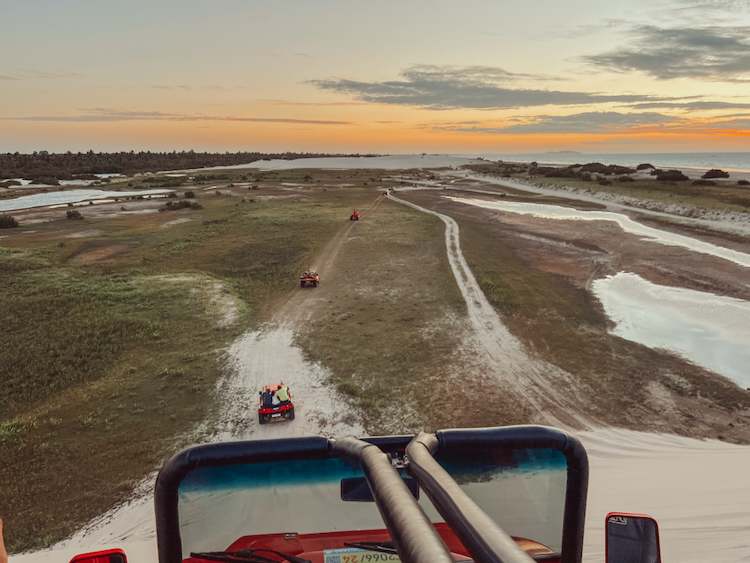
Some buggy drivers have massive Instagram followings. Besides driving you around for the day, they will ensure you get the best photos and videos at every stop.
Check out the following buggy drivers’ Instagram profiles. It will give you an idea of what to expect if you rent a buggy in Jeri.
@valpasseios
@RafaPasseios
@jerioffroad4x4
@rony.passeios
@danielpasseios
@fenix_tour_jeri
@robsonpasseios
You can also book through a tourism agency before or after you arrive in Jeri. Jeri Férias has excellent reviews and English language options on its website. Agencies like Loucos por Jeri and Partiu Jeri Turismo also have professional-looking websites with fantastic Google reviews.
Want even more adventure? See Jeri by ATV.
For more details about the best things to do, the best attractions and tours, and the best spots to relax in Jericoacoara, read my blog post – The 8 Best Things to Do in Jericoacoara.

Today the Village of Jericoacoara remains a special place in Brazil. Upon entering the village, visitors are whisked away into what feels like a tropical paradise.
Here the buildings are colorful and bungalow-esque, the sandy walkways are lined with vibrant Bougainvillea vines and lush palms, beach shops and restaurants are abundant, and at night twinkle lights and live music set the village’s constant festive mood.
The stresses of the outside world are forgotten in Jeri.
Related Posts…
The Best 8 Things to Do in Jericoacoara
How to hike to Pedra Furada: 4 different ways
The Best of Jericoacoara: A Fun & Easy 4 Day Itinerary
Belém, Brazil: Your Guide to the Amazon’s Best City
Alter do Chão: Your Ultimate Guide to the Amazon’s Paradise
How to Travel from Manaus to Santarém: 31 hours on an Amazon River Ferry
More places in Brazil to love

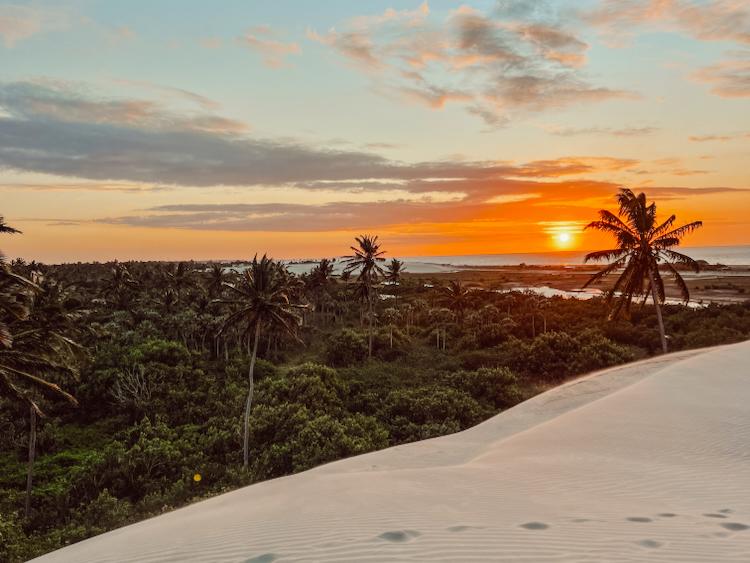
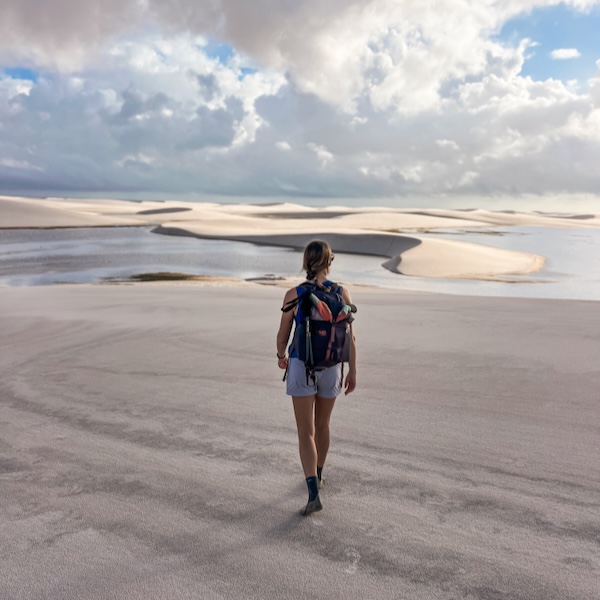
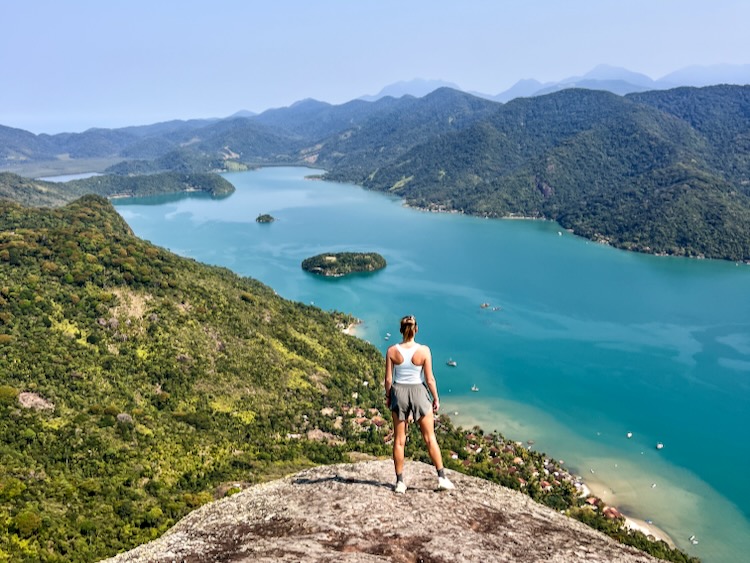

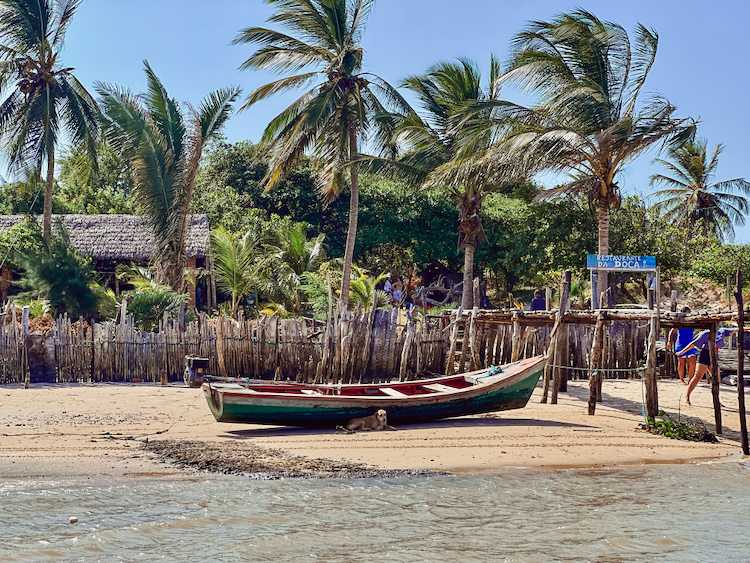
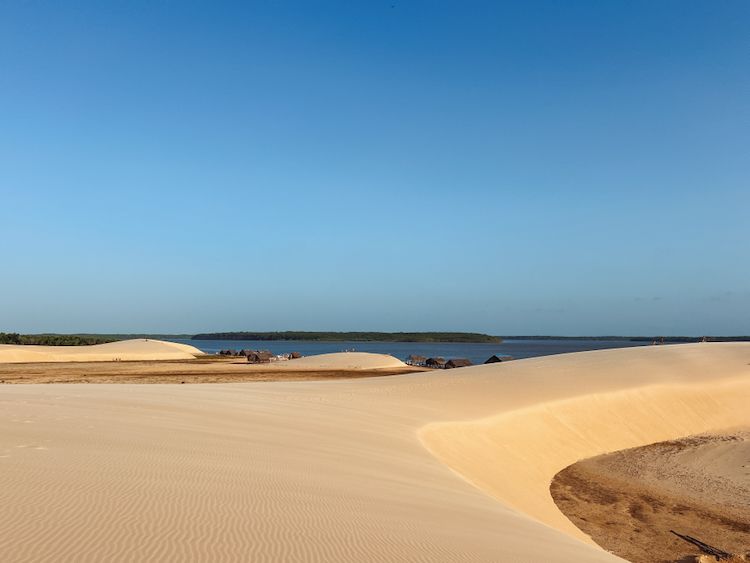
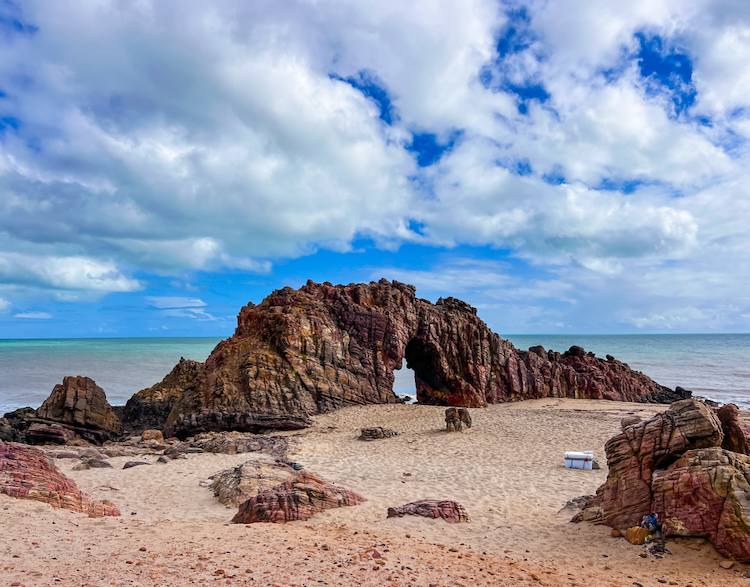
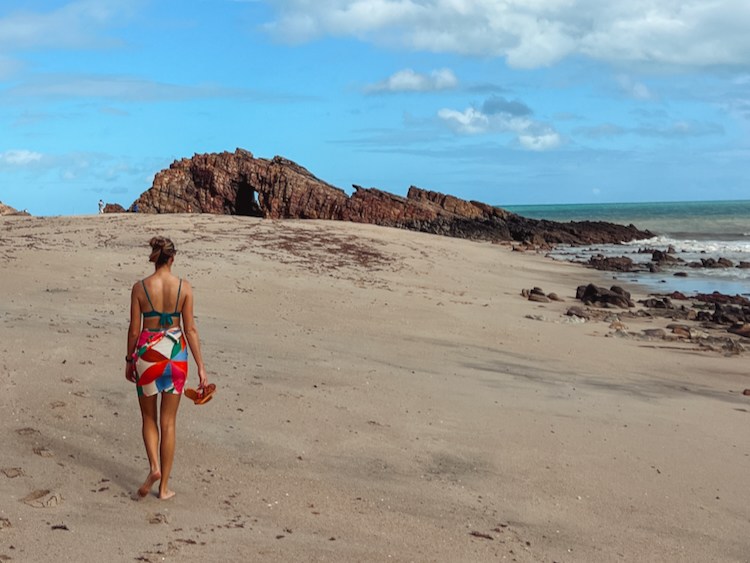



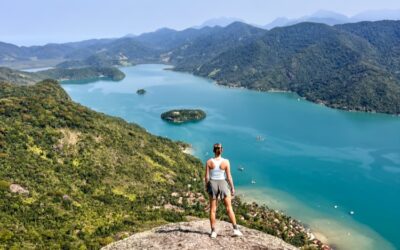


0 Comments